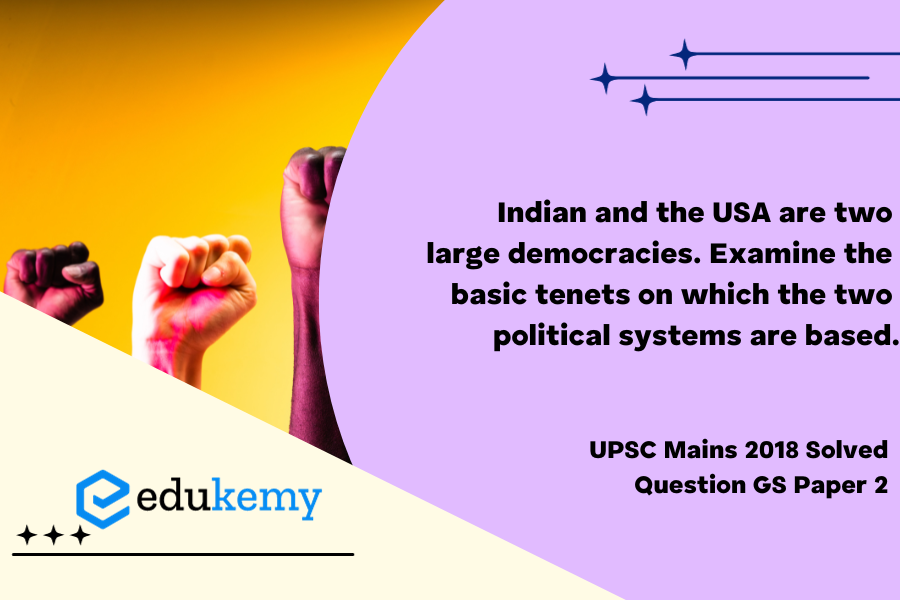India and the USA stand as two colossal democracies, each embodying distinct political landscapes shaped by their historical, cultural, and philosophical foundations. Despite their shared commitment to democratic ideals, the two nations diverge in their approaches to governance and the fundamental principles that underpin their political systems. In India, a diverse and pluralistic society, democracy is deeply rooted in the constitutional ethos that seeks to accommodate a myriad of cultures, languages, and religions. The Indian political system rests on the pillars of federalism, secularism, and a parliamentary form of government, fostering a delicate balance between unity and diversity. In contrast, the United States, with its strong emphasis on individual liberties and limited government, follows a federal, presidential, and representative democratic model. The American system is characterized by a separation of powers, a Bill of Rights enshrining fundamental freedoms, and an electoral process that underscores the importance of checks and balances. By examining the foundational tenets of these democracies, one gains insight into the nuanced ways in which India and the USA navigate the intricate terrain of governance, reflecting their unique historical trajectories and societal compositions.
Tag: Comparison of the Indian Constitutional scheme with that of other countries
Contents
Decoding the Question:
- In the Introduction try to briefly write about the Indian and the US Constitution.
- In Body, discuss various basic tenets on which the political systems of the USA and India are based.
- In Conclusion, try to write an overall comparative view of both political systems.
Answer:
India and the USA are the two largest representative democracies in the world. In the USA, democracy got its full swing with the drafting of the US Constitution in 1789 while the democracy in India is partially a result of British rule followed by the enforcement of the new, modern, and living constitution, framed after Independence. There are also many similarities and distinctions between the United States and India, although they are federal.

Basic Tenets on which both the Political Systems are Based:
- Rule of Law and Republicanism: Both countries have written constitutions ensuring the rule of law and guaranteeing fundamental rights to their citizens. Both the countries are republican and provide adult franchises to the citizens.
- Separation of Powers: In the USA, there is a clear-cut separation of powers between judiciary, executive, and legislature while the same is not observed exactly in India, as there is a fusion between executive and legislature.
- Fundamental Rights: In the US there is a Bill of Rights, while India has incorporated Fundamental Rights in its Constitution. However, the American Constitution has provided additional human rights, that are not explicitly found in the Indian Constitution. The American Constitution follows the principle of due process of law; on the other hand, India has a procedure established by law that gives wide discretionary power to the legislature to restrict liberty.In the Maneka Gandhi case, the Supreme court did not use the word due process but held that the procedure established by law must be fair, just, and equitable.
- Federal System: India is a federal parliamentary democratic republic in which the President of India is the head of state and the Prime Minister is the head of government whereas the United States is a federal presidential republic in which the President is the head of the state and of the government as well.
- Independent Judiciary: Both the political systems provide for an independent judiciary to interpret the constitution and enforce the law. However, in India a single system of courts enforces both the central laws as well as the state laws but in the USA, the federal laws are enforced by the federal judiciary and the state laws are enforced by the state judiciary.
- Party System: The USA has bi-party system while India has a multi-party system.
- Constitution: Both the Constitutions have the preamble; the amendment of the Constitution in India is easy and simple compared to the US.
Though the US and Indian political systems are similar in many respects, yet they are the product of their unique history and socio-economic milieu, and varying political culture. However, they should cooperate with each other on many fronts to provide hope to humanity which is facing numerous challenges. According to Dr. B R Ambedkar, the Indian Constitution was conceived with many outstanding features in the world like America but was adopted in the Indian sense. Despite the difference, both the systems worked successfully and have effectively and preserved national independence with a different history and challenges.
In case you still have your doubts, contact us on 9811333901.
For UPSC Prelims Resources, Click here
For Daily Updates and Study Material:
Join our Telegram Channel – Edukemy for IAS
- 1. Learn through Videos – here
- 2. Be Exam Ready by Practicing Daily MCQs – here
- 3. Daily Newsletter – Get all your Current Affairs Covered – here
- 4. Mains Answer Writing Practice – here


